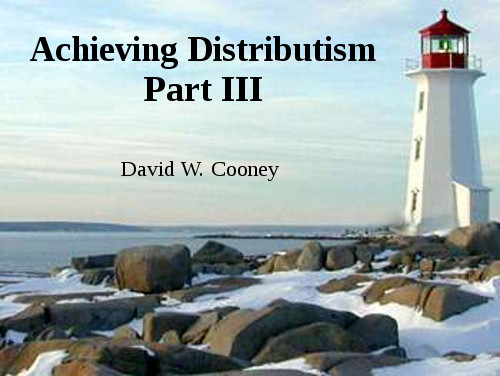18 June, 2015
Achieving Distributism - Part III
There are two social foundations of distributism; decentralized political authority according to the principles of subsidiarity, and the wide-spread private ownership of productive property. When established, these foundations will result in greater freedom for individuals and families throughout society in general and a more stable national economy supported by strong local economies. What is needed to actually achieve this? I believe it starts with shifting our philosophical outlook. We need to realize that economics is not the kind of science we have been told it is. We need to look beyond the immediate end of our economic activities and see how those activities fit within the overall community. If we do this, we will start to see how a local community is self-supporting in ways that corporate capitalism is not. We will start to see that, when we consider how our economic decisions can benefit or harm others in our community, we will all benefit.
04 June, 2015
Achieving Distributism - Part II
Asserting the right to own private property is not the same as asserting the right to acquire unlimited amounts of it, nor is it the same as saying there are no other limitations in regard to that acquisition. This is one point where capitalists will raise a huge objection. We must keep in mind that the basis of the right to private property is the right to secure for oneself, and one's family and heirs, the basic needs of life and the ability to achieve a good standard of living according to the social norms of the society at large. This is not merely a social right; it is a right based on our very existence as rational beings. Those who do not have this must be able to better their situation so that they do, and society must be structured so that anti-competitive forces cannot act to hinder them from being able to accomplish this for themselves.
Subscribe to:
Comments (Atom)


